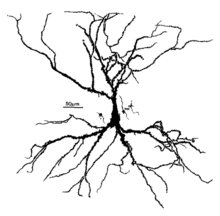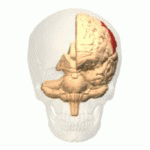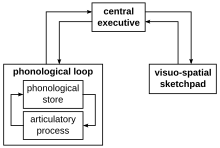Effects of alcohol on memory


Mode of actions
Effects on the hippocampus

Molecular effects on GABA and NMDA receptors

At higher doses, ethanol also affects
Effects on other brain regions
Alcohol also impairs and alters the functioning in the cerebellum, which affects both motor function and coordination.[27] It has a notable inhibitory effect on the neurons of the cerebral cortex, affecting and altering thought processes, decreasing inhibition, and increasing the pain threshold. It also decreases sexual performance by depressing nerve centers in the hypothalamus.[28][29] Alcohol also has an effect on urine excretion via inhibition of anti-diuretic hormone (ADH) secretion of the pituitary gland. Lastly, it depresses breathing and heart rate by inhibiting neuronal functioning of the medulla.[30]
Long-term memory

Explicit memory
Explicit memory requires conscious and intentional effort for recall.[31] It includes both episodic memory (for specific events, such as a party) and semantic memory (for general information, such as one's name).[31]
Alcohol impairs episodic encoding, specifically for cued recall, recognition of completed word fragments, and free recall.
High doses of alcohol severely disrupt the storage process of semantic memories.[34] Alcohol was found to impair the storage of novel stimuli but not that of previously learned information.[34] Since alcohol affects the central nervous system, it hinders semantic storage functioning by restricting the consolidation of the information from encoding.[34]
Retrieval of explicit memory is significantly impaired by alcohol. When compared to sober participants, intoxicated participants performed quite poorly on a recall task for everyday events (i.e., episodic memory).[35] Intoxicated participants are also slower to respond in reaction time tasks.[36] Alcohol also impairs retrieval in word recognition tasks.[32] When both encoding and retrieval take place during intoxication, there are surprisingly more impairments for cued recall than for free recall.[32] In terms of gender differences in retrieval processes, females tend to score lower than males on recall tasks when intoxicated.[36]
Implicit memory
Implicit memory does not require conscious effort or intention for recall.[31] It occurs when previous experience influences performance on a certain task.[31] This is evident in priming experiments. Implicit memory includes procedural memory, which influences our everyday behaviours, such as riding a bike or tying shoes.[31] People can perform these abilities without even thinking about them, which means procedural memory functions automatically. While retrieval of explicit memory is severely impaired by alcohol, retrieval of implicit memory is not.[35] Intoxicated subjects score higher on recognition tasks (involving implicit memory) than they can on recall tasks (involving explicit memory).[35]
Short-term memory


Brain areas affected by alcohol
Alcohol affects the functioning of the brain.
Tasks and intoxication findings
Short-term memory is commonly tested with visual tasks. Short-term memory, especially for non-verbal and spatial material, are impaired by intoxication.

Effects on working memory
In the short term
Alcohol consumption has substantial, measurable effects on working memory, although these effects vary greatly between individual responses. Not much is really known about the neural mechanisms that underlie these individual differences.
An interesting example of this is the failure of guitarists or other musicians performing concerts to cue in on auditory patterns and make it known that their performance is hindered by intoxication, whereas professional basketball (a less sequence-heavy activity for working memory) standout
It's a surprise because every day at practice, he came out in a mood to play. He came out in a basketball rage. He was fully committed; he wanted to let our upperclassmen know that he was the alpha male. It never came up that he had any sort of a problem with alcohol. This is the first I've heard of it.
In the long term
This article needs more PMID 28470828. (July 2017) |  |
Alcohol has been shown to have just some long-term effects on working memory. Findings have shown that in order for working memory to be substantially affected, long-term heavy drinking must be sustained over a long period of time, as up to one drink per day does not impair any cognitive function and may actually decrease the risk of a cognitive decline.[58] Furthermore, chronic alcoholism is associated with the impairment in both sustained attention and visual working memory. As a result, alcoholics have reduced ability, but not necessarily inability, to perform these executive tasks. This is assumed to be subserved by regions of the prefrontal cortex.[59] While it may not serve as a surprise that chronic alcoholism is linked to any decreased cognitive function such as working memory, one surprising finding is not only that even moderate levels of alcohol consumption during pregnancy were shown to have an adverse effect on the child's working memory when tested at 7.5 years of age, but also that working memory may be the most important aspect of attention that is adversely affected by prenatal alcohol exposure.[60]
Prospective memory
Prospective memory involves remembering to carry out an intended action in the future without an explicit reminder.[31] Alcohol has been found to impair this ability. Chronic heavy alcohol users report significantly more prospective forgetting compared to low-dose and alcohol-free controls.[61] The Prospective Memory Questionnaire assesses short-term habitual prospective memory, long-term episodic prospective memory, and internally cued prospective memory.[61] Chronic heavy alcohol users reported significantly greater deficits for all three aspects of prospective memory.[61] Individuals that report heavy alcohol use report 24% more difficulties with prospective memory than those who report that they are light drinkers and 30% more difficulties than those who report that they never drink.[62] The effects of alcohol on prospective memory can also be assessed in the laboratory by simulating prospective memory tasks that individuals face in everyday life. Individuals who are given 0.6 g/kg alcohol prior to performing prospective memory tasks do significantly poorer than a placebo group.[63] Alcohol can damage the prefrontal and frontal areas of the brain, and this may be responsible for prospective memory impairments since prospective memory performance is highly correlated with frontal executive functions.[61]
In popular culture
The memory inhibiting effects of alcohol are often a prominent topic in popular culture. It appears in movies, books, and television shows. Several movies show characters drinking alcohol to the point of memory loss and awakening the next morning with a host of problems due to actions they performed while intoxicated.
One example is The Hangover, where three groomsmen lose the groom during a bachelor party in Las Vegas, so they retrace their steps to find him.[64] The characters still had functioning implicit/procedural memory, which allowed them to carry out the many acts they performed that night, but their episodic memory was impaired and thus they had no recollection of the events occurring. In addition to alcohol the characters were also under the influence of flunitrazepam.
Another movie is What Happens in Vegas. After an intoxicated night in "Sin City," two people wake-up to find they got married.[65]
Songs such as Waking Up in Vegas by Katy Perry[66] and Last Name by Carrie Underwood[67] also depict characters waking up and not remembering the night before due to alcohol consumption.
By some accounts, popular culture makes light of the memory problems that can result from alcohol consumption.
The court case
See also
- Confabulation
- Effects of alcohol on visual memory
- Wernicke–Korsakoff syndrome
References
- ^ Merriam-Webster's Online Dictionary
- S2CID 23068837.
- S2CID 4326182.
- PMID 3760943.
- S2CID 37879454.
- ^ Ryabinin AE, Criado JR, Henriksen SJ, Bloom FE, Wilson MC (1997). Differential sensitivity of c-Fos expression in hippocampus and other brain regions to moderate and low doses of alcohol. Mol Psychiatry, (1),32-43.
- S2CID 22730822.
- PMID 9084598.
- ^ White, A (2003). "What Happened? Alcohol, Memory Blackouts and the Brain". Alcohol Research & Health. 27 (2): 186–196.
- PMID 16717187..
- ^ PMID 19455309.
- S2CID 6395717.
- PMID 10781603.
- S2CID 43784032.
- PMID 2467382.
- PMID 2158533.
- S2CID 26168622.
- PMID 8478698.
- PMID 8749814.
- PMID 20603193.
- PMID 19077056.
- S2CID 15529888.
- PMID 11597760.
- PMID 12658110.
- PMID 15549054.
- S2CID 38391993.
- PMID 16899043.
- PMID 8393888.
- PMID 8934293.
- S2CID 45576960.
- ^ a b c d e f g h i j k l m n Baddeley, A., Eysenck, M.W. and Anderson, M.C. (2009). Memory. New York, NY: Psychology Press.
- ^ S2CID 2084273.
- ^ PMID 20049223.
- ^ .
- ^ PMID 2944987.
- ^ S2CID 40873039.
- PMID 8022966.
- ^ PMID 18179311.
- S2CID 41154421.
- S2CID 20409183.
- ^ Tapert, S.F.; Brown, G.G.; Kindermann, S.S.; Cheung, E.H.; Frank, L.R.; Brown, S.A. (2006). "fMRI measurement of brain dysfunctions in alcohol-dependent young women". Alcoholism: Clinical and Experimental Research. 25 (2): 26–245.
- S2CID 33190123.
- PMID 1502513.
- ^ PMID 10791858.
- PMID 6646395.
- ^ S2CID 147314783.
- PMID 6242732.
- PMID 10353377.
- PMID 6700218.
- S2CID 24469283.
- ^ PMID 660094.
- S2CID 24469283.
- ^ a b Baddeley, A. (1998) Comptes Rendus de l'Académie des Sciences – Série III, 321(2-3), 167-173.
- ^ Paulus, Martin P, Tapert, Susan F, Pulido, Carmen, & Schuckit, Marc A. (2006). Alcohol attenuates load-related activation during a working memory task: Relation to level of response to alcohol. Dept of Psychiatry, University of California. PP 2
- ^ S2CID 23894568.
- ^ Grattan-Miscio, K.E. and Vogel-Sprott, M. (2005) Effects of alcohol and performance incentives on immediate working memory. Springer Berlin / Heidelberg, 188-196
- ^ Post Staff Report (3 December 2009). "Artest took drinking from St. John's to NBA halftimes". New York Post. Archived from the original on 18 December 2021. Retrieved 18 December 2021.
- PMID 15659724.
- S2CID 508770.
- PMID 15770121.
- ^ PMID 12003916.
- PMID 12824818.
- S2CID 21923512.
- ^ "The Hangover" (2009). Retrieved from https://www.imdb.com/title/tt1119646/.
- ^ "What Happens in Vegas" (2008). Retrieved from https://www.imdb.com/title/tt1033643/plotsummary.
- ^ "YouTube – Waking Up in Vegas Lyrics – Katy Perry" (2009). Retrieved from https://www.youtube.com/watch?v=06Qf7GdAF70
- ^ "YouTube – Carrie Underwood – Last Name" (2009). Retrieved from https://www.youtube.com/watch?v=f27zNlmRMWU
